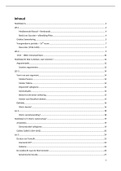Summary
Samenvatting Denken over denken, ISBN: 9789463370028 Inleiding Tot De Wijsbegeerte (P0M32a)
- Course
- Institution
- Book
Dit is een samenvatting van alle lessen, ik heb ook het boek gelezen en aangevuld waar nodig. De afbeeldingen uit de powerpoint heb ik overgenomen en uitleg bij gezet. Ik was er vlotjes door met enkel mijn samenvatting te leren.
[Show more]




